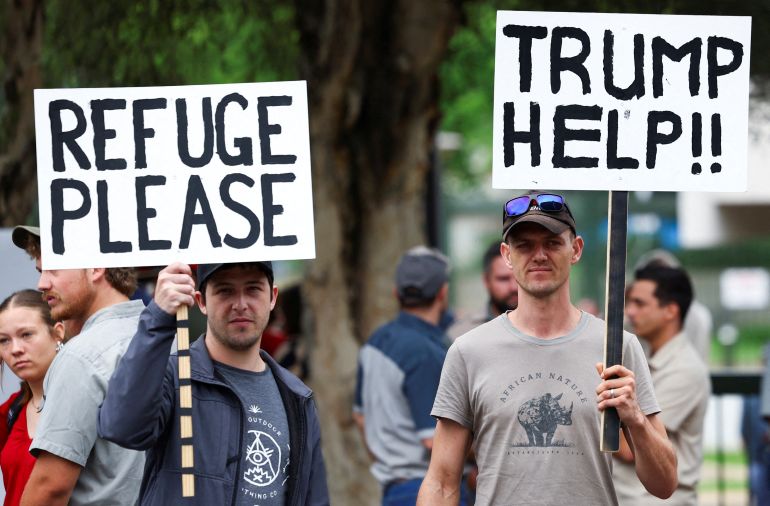On Wednesday, South Africa’s President Cyril Ramaphosa will meet with US President Donald Trump in an effort to repair deteriorating relations between the two nations.
The recent passing of a land expropriation law in South Africa, which Trump denounced and claimed equates to “persecution” of the country’s wealthy white minority, is a major source of contention between the two leaders.
The first group of white “refugees” arrived in the US last week as part of a larger relocation strategy under the Trump administration. The government of South Africa has refuted reports of “white genocide” or persecution there.
What are the key legal jargons for you:
The Expropriation Law: What Is It?
Due to opposition from the Democratic Alliance (DA) party, a member of the coalition government, President Ramaphosa signed the Expropriation Bill into law in January after months of debate in parliament.
The law permits the government to seize land from any private owner, whether white or not, for public purposes and public interests, including infrastructure projects, expanding the scope of public services, environmental protection, land reform, or achieving equitable resource distribution.
The law allows seizures without compensation in some circumstances, but it also provides for fair compensation.
It replaces the 1975 Expropriation Act, which was criticized for being legally unclear and lacked clear compensation plans, in the wake of apartheid.
However, some Afrikaner groups fear property values will decline as a result of the new law’s potential impact on their land, possibly violently. Former member of Ramaphosa’s African National Congress (ANC), the DA is viewed primarily as representing white and Afrikaner interests.
White Afrikaners are primarily descendants of Dutch colonizers, who had a domineering role in the nation’s apartheid system up until 1990, segregating and excluding the Black majority. White farmers and business owners are still a significant percentage of the country’s top business leaders.
Despite a population of just 7 percent, White South Africans also collectively own 70% of the country’s land.
Meanwhile, more than half of Black people fall under the poor category. A small percentage of people have access to land. The new law, according to Ramaphosa’s government, will allow the government to redistribute land to a number of historically underrepresented groups, including Black people, women, and people with disabilities.
Ramaphosa’s office stated in a statement from February that the law was a necessary policy to ensure the equitable distribution of wealth. As punishment, land seizure is a requirement for fisciation.
The recently passed Expropriation Act is not a confiscation tool, but rather a constitutionally mandated legal process that guarantees the public’s right to access land in an equitable and just manner, according to the statement.
According to the office, “South Africa has always had expropriation laws that balance the need for public use of land with the protection of property owners’ rights,” like the United States of America and other nations.
Under the new law, no land had been forcibly taken over by the South African government by the end of May.

What have the law-related opinions of Trump and his supporters?
Trump decreed in February that South Africa’s “unjust racial discrimination” be reduced from US financial aid. Trump cited South Africa’s alleged genocide claim against Israel at the International Court of Justice (ICJ) in December 2023 in his ruling in his order.
The Republic of South Africa (South Africa) recently passed the Expropriation Act 13 of 2024 (Act) to allow the country’s government to seize the agricultural property of its ethnic minority Afrikaners without compensation, the order read in the order.
Trump continued, “The United States cannot support the government of South Africa’s commission of human rights violations in its country or its undermining American foreign policy, which threatens our nation, our allies, our African partners, and our interests,” adding.
Prior to that, the US had sponsored South Africa’s HIV/AIDS program through the PEPFAR initiative, or President’s Emergency Plan for AIDS Relief. When Trump stopped US foreign aid on a global scale in January, that aid was already stopped.
Elon Musk, a Trump ally and businessman born in South Africa, has also made a strong argument against the land law, which some experts believe has an impact on how the Trump administration approaches the country.
Musk has claimed that the government of South Africa is failing to stop the “genocide” of white farmers. He has also criticized “racist ownership laws” for Starlink, his satellite internet company,’s failure to launch in the nation. According to South African law, marginalized groups must own a portion of large businesses and those looking for government partnerships.
What other tensions exist between the two nations?
Trump has also brought up allegations made by a group of white South Africans, who claim white farmers are subject to an excessive number of violent assaults on their farms, which they claim amount to a “genocide.”
The government of Ramaphosa denies those claims, saying farmer deaths are a result of a larger crime problem. Due to the rural’s extreme isolation, farm attacks and murders are frequent in the nation. In assault, robbery, and murder cases, both white and black farmers have been the victims. The South African government doesn’t release information about crimes committed against minorities.
Source: Aljazeera

Leave a Reply